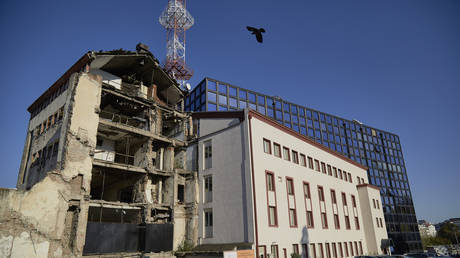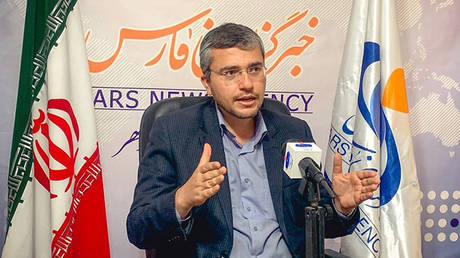
It is a travesty of international justice that the 1999 bombing remains unrecognized by the perpetrators and unpunished
Twenty-three years ago, NATO bombed Serbia. This act was the opening round of what was to become a 78-day illegal war of aggression, the repercussions of which haunt the world to this day.
Act One: The Encounter
It was a chance meeting – two men who had crossed paths in Iraq two years past, now running into each other on a stretch of highway connecting Kosovo to Macedonia. The date was March 20, 1999. Monitors assigned to the Organization for Security and Co-operation in Europe (OSCE) Kosovo Verification Mission (KVM) were in the process of being withdrawn from their assigned areas of responsibility to the town of Ohrid, in Macedonia, due to the collapse of diplomatic talks with Serbia about the devolving situation in the Serbian autonomous province of Kosovo, where Albanian separatists were engaged in a quasi-civil war with the Serbian authorities.
The British contingent of the KVM was stopped at the border between Kosovo and Macedonia, awaiting final clearance to cross the border. Among the British observers was a former Royal Marine officer who had previously served with the United Nations Special Commission (UNSCOM) in Iraq, helping oversee the dismantling of Iraqi weapons of mass destruction programs. While he and his fellow observers waited, he watched as other vehicles driven by members of the US observer contingent drove in the opposite direction – into Kosovo. At the wheel of one of these vehicles was a familiar face – a man who was known as ‘Kurtz’.
Kurtz was a man of tremendous experience who was brought into UNSCOM in mid-1997 for the purpose of providing operational planning and leadership. ‘Kurtz’, of course, was not his real name, but rather a nickname derived from the fact that with his shaved head, walrus mustache, and weathered face, he looked like a combination of Robert Duvall’s Colonel Kilgore and Marlon Brando’s Colonel Kurtz in the movie ‘Apocalypse Now’. With a wide-brim Stetson, cowboy boots, and an ever-present wad of chewing tobacco stuck in his cheek, he looked every bit the part.
Kurtz was picked for this job in part because of his background, which was embedded in the world of covert special operations. His most recent assignment prior to coming on board at UNSCOM was preparing diplomats for E&E – escape and evasion – from hostile situations. Given the sensitivity of some of the UNSCOM operations taking place in Iraq at that time, it was thought that such training might be ideal for situations the inspectors might find themselves in.
But Kurtz’s background had been his undoing. He was, so to speak, too ‘black’, or covert, for his own good. Even though he was performing wonderfully in Iraq, his managers in Washington began to panic when the situation in Baghdad began to deteriorate in October 1997. The decision was made to pull Kurtz out of Iraq. It was bitter irony – the one man who was best equipped to deal with a hostage situation, to keep not only himself but other, less fully-trained personnel alive and well, was being withdrawn in haste out of fear of his being taken hostage.
Once Kurtz was assigned to UNSCOM, he was technically UN property for the duration of the assignment, and the US could not just simply snap its fingers and bring him home. But snap, they did, with the US ambassador, Bill Richardson, summoning the Australian diplomat who headed UNSCOM, Richard Butler, to the US Mission in New York for a meeting. “One of the personnel provided to you [Kurtz],” Richardson said, “is a bit too exposed by the current situation, and we feel that it would be best for us all if he were withdrawn at this time.”
I oversaw the team in Iraq that Kurtz and the British officer were assigned to. Butler called me up to his office after his meeting with Richardson. “The man’s CIA,” he told me. “The Americans want him out.”
Now, as the Kosovo Monitoring Mission was departing Kosovo, Kurtz was back in action. The Americans, it seemed, wanted this man with the impressive covert operations skill set back in.
The role played by the CIA in the OSCE KVM is quite controversial – at a time when the US and NATO were accusing the Serbian government of committing atrocities, the CIA was using the cover provided by the OSCE observer mission to coordinate with fighters from the Kosovo Liberation Army who were engaged in a guerilla war with the Serbian military. Serbian operations in response to CIA-directed KLA attacks were being characterized by the West as ‘genocide’, and used to justify a planned NATO aerial bombardment of Serbia.
These facts, however, ran counter to the narrative of a Serbian-initiated campaign of ethnic cleansing which the US and NATO were spinning. The British OSCE observers were well aware of the complex reality of what was transpiring inside Kosovo, where legitimate Serbian military operations against known KLA forces were being described as “massacres of innocent civilians” by the Western media. The truth, however, was often inconvenient, which is why at that moment in time, on March 20, 1999, the British observer contingent found itself exiting Kosovo at the same time Kurtz and his fellow CIA officers were going in.
Act Two: The Phone Call
March 24, 1999. 9:20am. In the White House Situation Room, an aid places a phone call to the Kremlin, where Russian President Boris Yeltsin is waiting. The call goes through, and the aid hands the phone to Bill Clinton, the 42nd president of the United States. The conversation started off with a grim notification: The leaders of NATO, including himself, Clinton said, “have decided we have to launch air strikes against military targets in Serbia soon.”
The problem, Clinton noted, was the Serbian leader, Slobodan Milosevic. “He has displaced 30,000 more people just since last Friday,” Clinton said. “He is killing innocent people. We have reports of summary executions.” Left unspoken was the role played by Kurtz and his fellow CIA operatives in creating the conditions for such actions. Clinton continued. “He [Milosevic] has basically told Russian, EU, and American negotiators that he doesn’t care what any of us think.”
Clinton was getting worked up by the consequences he had triggered by unleashing the CIA on Kosovo. “My God, they [the Europeans]have nightmares they’ll [the Serbs]repeat Bosnia and all the instability and all the problems, and it will spread from Kosovo to Macedonia to Albania and engulf all of their southern flank. They are very, very worried about it. They are right to be worried about it.”
Again, left unsaid was the fact that the very scenario that was giving the Europeans nightmares had been carefully crafted by the CIA, at Bill Clinton’s direction.
Yeltsin wasn’t buying any of it. “It is easy to throw bombs about,” he said, dismissing Clinton’s characterization of the problem and proffered solution. “It is intolerable because of the hundreds of thousands of people who will suffer and die.”
The consequences of any NATO strike, Yeltsin warned Clinton, were dire. “In the name of our future, in the name of you and me, in the name of the future of our countries, in the name of security in Europe, I ask you to renounce that strike, and I suggest that we should meet somewhere and develop a tactical line of fighting against Milosevic, against him personally. And we are wiser, we are more experienced, and we can come up with a solution. That should be done for the sake of our relationship. That should be done for the sake of peace in Europe.”
The Russian leader’s pleas fell on deaf ears. “Well, Boris,” Clinton replied, “I want to work with you to try and bring an end to this, but I don’t believe there is any way to call off the first round of strikes because Milosevic continues to displace thousands of people every day… I don’t want this to be a great source of a split between Russia and Europe and Russia and the US. We have worked too hard. There are too many economic and political things for us to do together, and I regret this more than I can say.”
The American president was outright lying to his Russian counterpart – the events in Kosovo were unfolding along the lines of a carefully scripted game plan that had been in motion for some time. War was inevitable because the US, through the CIA, had shaped the narrative to make it so. Worse, the US president was willing to sacrifice relations between the US and Russia in pursuit of this NATO objective. This fact was driven home by Yeltsin in his closing remarks.
“[O]ur people,” Yeltsin lamented, “will certainly from now on have a bad attitude with regard to America and NATO. I remember how difficult it was for me to try and turn heads of our people, the heads of politicians towards the West, towards the United States, but I succeeded in doing that, and now to lose all that. Well, since I failed to convince the President, that means there is in store for us a very difficult, difficult road of contacts, if they prove to be possible. Goodbye.”
Act Three: The Bomb
On the evening of March 24, 1999, the secretary general of NATO, Javier Solana, a Spanish diplomat, authorized aircraft operating under the auspices of NATO to begin bombing targets in Serbia. It was no coincidence that the first aircraft to drop bombs on Serbia were F/A-18s belonging to the Spanish Air Force.
When examining the legitimacy of the use of force by Spain against Serbia in March 1999, several facts stick out. First is that Spain, as a member of the United Nations, is bound by its commitment to the Charter of that organization. When it comes to the use of force, the UN Charter is quite clear – there are only two acceptable conditions under which such force might be legitimately employed by a member state. One is an enforcement action to maintain international peace and security, carried under the authority of a resolution passed by the Security Council under Chapter VII of the Charter. The other is the inherent right of individual and collective self-defense, as enshrined in Article 51 of the Charter.
As Spanish bombs fell on Serbian soil, two things were quite clear – there was no Chapter VII resolution in existence which authorized an enforcement action against Serbia, and Serbia had committed no act of aggression against either Spain or its NATO allies that would justify any claim of self-defense in explaining the Spanish (and NATO) military assault on Serbia.
In short, by dropping bombs on Serbia, the Spanish Air Force was initiating an illegal war of aggression. “To initiate a war of aggression,” the judges who comprised the International Military Tribunal convened in Nuremburg to judge the crimes of Nazi Germany, declared, “is not only an international crime; it is the supreme international crime differing only from other war crimes in that it contains within itself the accumulative evil of the whole.”
Spain wasn’t alone that night – aircraft from the air forces of the United States, Great Britain, Germany, France, and other NATO members participated in this “supreme international crime.” Viewed individually, there is no doubt that each nation involved in the attack on Serbia violated the UN Charter and, as such, is guilty of the crime of initiating an illegal war of aggression.
Not so fast! NATO, it seems, had crafted a novel legal argument built around the notion that it had a right to anticipatory collective self-defense under Article 51 of the UN Charter, and that this right was properly exercised under “normative expectation that permits anticipatory collective self-defense actions by regional security or self-defense organizations where the organization is not entirely dominated by a single member.” NATO, ignoring the obvious reality that it is, indeed, dominated by the United States, postulates that it is, indeed, such an organization, comprised as it is of “a number of powerful states, three of which are permanent members of the Security Council.”
The credibility of the NATO claim of “anticipatory collective self-defense,” however, arises from its characterization of the Kosovo crisis as a humanitarian disaster infused with elements of genocide which created not only a moral justification for intervention, but a moral necessity.
Tell that to Kurtz, the man who, together with his fellow CIA operatives acting under the authority given them by the president of the United States, Bill Clinton, worked to create conditions on the ground inside Kosovo that could then be used to manufacture the very narrative of a humanitarian crisis sufficient in scope and scale to allow NATO to craft its novel legal justification for attacking Serbia.
The problem for NATO is that its legal justification was built on a foundation of lies. The fiction that NATO is an organization not entirely dominated by the United States evaporates the moment one understands the role played by the CIA in preparing the script used by NATO to justify its actions. The fact that this script promulgated outright fabrications of alleged crimes perpetrated by Serbia to justify NATO military intervention only underscores the criminal nature of the entire NATO enterprise.
There is no escaping the fact that when the first bomb dropped by the Spanish Air Force on Serbia that evening 23 years ago to this date impacted on the ground, Spain and every other member of NATO had committed the “ultimate crime.”
That this crime remains unpunished is a travesty of international justice. That this crime remains unrecognized by those who perpetrated it is a testament to the hypocrisy of nations. That this crime set in motion the events that have led to the current state of affairs between the US and NATO on the one hand, and Russia on the other, is a global tragedy.




